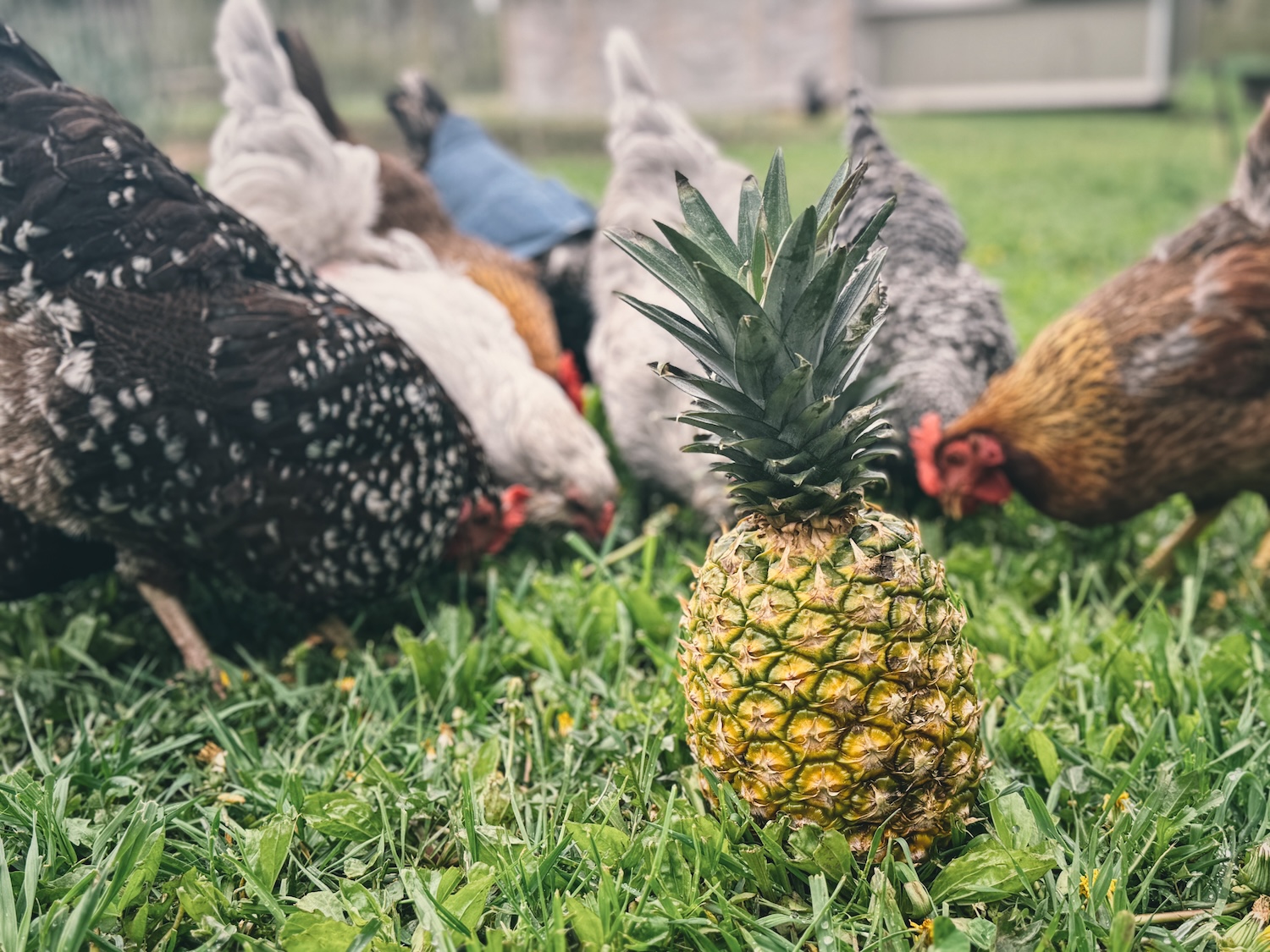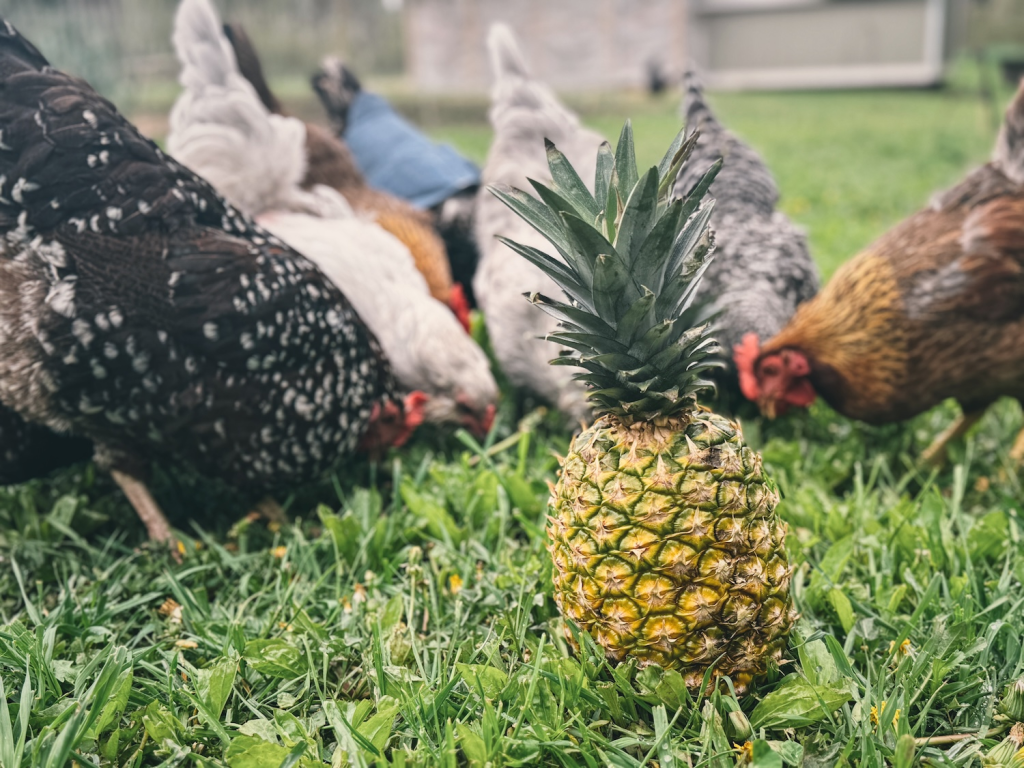Can Chickens Eat Pineapple Safely? A Complete Nutrition Guide for Backyard Flocks
Keeping backyard chickens has become increasingly popular in the U.S., especially among families who want to raise their own eggs, reduce food waste, and enjoy the companionship of small farm animals. With this rise comes an important question: “Can chickens eat pineapple?”
The short answer is yes, chickens can eat pineapple in moderation — but there is much more to understand before feeding it to your flock. Pineapple is nutritious, vitamin-rich, and hydrating, but its acidity, texture, and sugar content mean it must be fed correctly to avoid digestive issues.
This comprehensive guide goes beyond the basics. We’ll dive deep into the nutritional science, the digestive biology of chickens, the safe parts of pineapple to offer, how often you can feed it, and the right way to introduce tropical fruits into a flock’s diet.
Whether you’re an experienced chicken keeper or a new backyard flock owner, this 3000-word guide gives you everything you need to know.
Understanding Chicken Digestion: Why Certain Fruits Are Safe or Unsafe
To understand whether chickens can eat pineapple, it’s important to know how their digestive system works. Chickens have a unique digestive system that determines which foods they can process easily — and which can cause problems.
1. The Beak and Pre-Digestion Stage
Chickens peck and tear soft foods but cannot chew. Their beaks break pineapple into small pieces, and saliva begins to moisten food, but there is no chewing or grinding at this stage.
2. The Crop
Food travels to the crop, a small pouch where it softens. Sugary fruits like pineapple pass through quickly, which can be helpful — but too much sugar can disrupt the balance of bacteria.
3. The Gizzard (The Real “Chewing” Organ)
Chickens do not have teeth. Instead, the muscular gizzard grinds food with the help of grit (tiny stones they swallow). Because pineapple is soft, it does not stress the gizzard. However, the fibrous core can be harder to break down.
4. Digestive Enzymes and Fermentation
Chickens produce enzymes that break down carbohydrates, proteins, and fats, but very acidic foods can irritate the gut lining if eaten excessively.
Pineapple is safe, but feeding it correctly is essential.
Is Pineapple Safe for Chickens? The Detailed Answer
Yes, pineapple is safe for chickens as long as it is fed properly. Fresh pineapple contains vitamins A, C, B6, manganese, antioxidants, fiber, and hydration — all extremely beneficial for flock health.
However, concerns include:
- High acidity
- High sugar content
- Tough core
- Hard, spiky skin
- The enzyme bromelain, which breaks down protein
None of these make pineapple dangerous, but they do require moderation.
Let’s break it down.
Nutritional Benefits of Pineapple for Chickens
Pineapple contains a surprising number of essential nutrients that support overall flock health.
1. Vitamin C
Chickens don’t require a large intake of vitamin C because they produce some internally, but additional vitamin C helps during:
- Heat stress
- Illness
- Molting
- Extreme weather
Pineapple is an excellent natural source.
2. Manganese
Important for:
- Eggshell strength
- Bone development
- Metabolic function
High-quality eggs benefit significantly when hens consume manganese-rich foods.
3. Antioxidants
Pineapple’s antioxidants help reduce inflammation, boost immune responses, and protect cells from oxidative stress.
4. Fiber
Fiber supports healthy digestion and prevents sour crop when fed in reasonable amounts.
5. Natural Hydration
Pineapple contains over 80% water, making it a refreshing summer treat that combats dehydration.
The Bromelain Question: Is It Safe For Chickens?
Pineapple contains bromelain, an enzyme that breaks down proteins. Some chicken owners worry this might harm birds, but scientific studies show:
- Bromelain is safe for poultry in small amounts
- It may even support digestion
- It has mild antibacterial properties
- Large quantities may irritate the mouth or crop
So, pineapple is safe — just not in large, daily amounts.
Parts of the Pineapple: Which Can Chickens Eat?
1. Pineapple Flesh
The soft, sweet flesh is the safest and most nutritious part. This should be the main portion fed to chickens.
2. Pineapple Core
Chickens can eat the core, but:
- It’s high in fiber
- It’s tougher for the gizzard to grind
- Some birds may leave it uneaten
Cutting the core into very small pieces helps.
3. Pineapple Skin
Avoid feeding the outer skin. Reasons:
- Too tough and fibrous
- Spikes can injure beaks
- Hard to digest
- Potential pesticide residue
4. Pineapple Leaves
Do not feed. They are too fibrous and contain high concentrations of irritants.
How to Feed Pineapple Safely to Chickens
Proper preparation makes pineapple much safer and easier for chickens to digest.
1. Feed in Small Pieces
Cut pineapple into small chunks or thin strips. Chickens can choke on overly large pieces of fruit.
2. Only Feed Fresh Pineapple
Avoid:
- Canned pineapple (high sugar syrup)
- Dried pineapple (concentrated sugar)
- Fermented pineapple (too acidic)
Fresh is best.
3. Remove the Skin and Spiky Crown
Only feed ripe, clean fruit.
4. Introduce Slowly
Give a few small pieces the first time to monitor digestive reactions.
5. Use Pineapple as a Treat
Not a main diet item. Fruit should be:
No more than 5–10% of total diet
How Often Can Chickens Eat Pineapple?
A safe feeding frequency:
- 1–2 times per week during warm weather
- Once a week during colder months
Too much pineapple can cause:
- Loose stools
- Crop irritation
- Disrupted gut flora
- Excessive sugar intake
Moderation is essential.
Best Ways to Serve Pineapple to Chickens
1. Fresh Cubes
Simple, easy, and nutritious.
2. Mixed in a Fruit Blend
Combine with berries, melon, or grapes for a balanced vitamin treat.
3. Frozen Pineapple Chunks
Perfect summer hydration.
4. Pineapple Mash
Mashing softens fiber and makes digestion easier.
Does Pineapple Improve Egg Quality?
Yes — indirectly.
Manganese and vitamins in pineapple can:
- Strengthen eggshells
- Improve yolk color
- Support bone health in laying hens
- Boost flock immunity
But remember, overfeeding fruit may reduce protein intake, which hurts egg production.
Balance is key.
Can Baby Chicks Eat Pineapple?
Chicks younger than 8–10 weeks should not eat pineapple because:
- Their digestive systems are developing
- Sugar disrupts gut flora
- Acid can irritate the crop
Older chicks can have very small, occasional pieces.
Can Pineapple Replace Grit or Protein?
No. Pineapple cannot replace:
- Grit
- Layer feed
- Protein sources
- Calcium supplements
It is a treat, not a staple.
Health Risks of Feeding Pineapple Incorrectly
Too much pineapple may lead to:
- Sour crop
- Diarrhea
- Mouth irritation from bromelain
- Dehydration from excessive sugar
- Reduced protein intake
- Behavioral dependence on sweet treats
Feeding small, controlled portions prevents these problems.
Comparing Pineapple to Other Fruits Chickens Eat
| Fruit | Safe? | Notes |
|---|---|---|
| Pineapple | Yes | Acidic; feed in moderation |
| Watermelon | Yes | Highly hydrating |
| Grapes | Yes | Very sugary; limit |
| Citrus | Limited | Too acidic |
| Apples | Yes | Remove seeds (cyanide) |
| Bananas | Yes | High sugar; soft texture |
| Strawberries | Yes | Rich in antioxidants |
Pineapple is among the safest tropical fruits when fed correctly.
Do Chickens Like Pineapple?
Most chickens love pineapple because:
- It’s sweet
- Soft texture
- Hydrating
- Fragrant
However, some chickens dislike acidic flavors. Always observe flock preferences.
Environmental Benefits: Using Pineapple to Reduce Kitchen Waste
Feeding safe pineapple scraps (flesh + soft inner pieces) to chickens:
- Reduces landfill waste
- Repurposes leftover food
- Supports sustainable backyard farming
- Lowers feed costs
Just avoid using skin and crown.
FAQ: Can Chickens Eat Pineapple?
1. Is pineapple safe for chickens to eat?
Yes, pineapple is safe for chickens when fed in moderation. It contains vitamin C, manganese, antioxidants, and natural sugars that can support their immune system. However, because pineapple is acidic and sugary, overfeeding can upset their digestive system.
2. How much pineapple can chickens eat at one time?
A good guideline is no more than 1–2 tablespoons per chicken, served only as a treat. Fruits should never exceed 10% of a chicken’s total diet, with 90% being feed, grains, and greens.
3. Can chickens eat pineapple skin or the tough core?
Not recommended.
The skin is fibrous and tough, making it difficult for chickens to tear apart and digest. The core is extremely hard and can cause choking or crop impaction. Stick to soft, ripe pineapple flesh only.
4. Can chickens eat canned pineapple?
Avoid canned pineapple.
Most canned pineapple contains heavy syrup, added sugar, and preservatives, which are not healthy for chickens. Only fresh, raw pineapple is recommended.
5. Is dried pineapple OK for chickens?
No.
Dried pineapple is extremely high in concentrated sugar, which can cause obesity, lethargy, or digestive upset in chickens.
6. How often can chickens eat pineapple?
Once or twice per week is safe. Too much acidic fruit can irritate their digestive tract and may lead to sour crop.
7. Can baby chicks eat pineapple?
No.
Chicks have very sensitive digestive systems and should not have acidic or sugary fruits until at least 12 weeks of age, and even then only in small amounts.
8. Can chickens eat pineapple leaves?
Not recommended.
The leaves are coarse, sharp, and can irritate the digestive lining. Most chickens won’t attempt to eat them, but remove them just in case.
9. Are there any health benefits to feeding chickens pineapple?
Yes — when fed properly, pineapple can provide:
- Vitamin C for immunity
- Hydration due to high water content
- Manganese for bone health
- Natural antioxidants
- Energy from natural sugars
However, pineapple should never replace their main feed.
10. Can pineapple help chickens in hot weather?
Yes, pineapple contains high water content which can help cool chickens during summer. Combine small pineapple cubes with other hydrating fruits like watermelon or cucumber for a refreshing treat.
11. Can pineapple cause diarrhea in chickens?
Yes, if overfed.
Pineapple’s acidity and sugar can loosen stools. Feed only small portions and monitor their droppings.
12. Should pineapple be washed before serving?
Absolutely. Pineapple skin may contain pesticides or dirt. Even if you don’t feed the skin, washing prevents contamination during cutting.
13. How should pineapple be prepared for chickens?
- Peel the skin
- Remove the core
- Cut soft flesh into bite-sized cubes
- Serve fresh, not cooked
- Avoid mixing with sugary fruits
Keep portions small.
14. Can pineapple affect egg quality in chickens?
Indirectly, yes — if overfed.
Excess sugar or digestive upset can cause stress, leading to fewer eggs or eggs with thinner shells. Moderate feeding is safe.
15. What signs show that a chicken shouldn’t eat pineapple anymore?
Watch for:
- Loose stool or diarrhea
- Sour crop
- Lethargy
- Reduced appetite
- Changes in egg laying
- Refusal to eat the fruit
If symptoms appear, stop pineapple immediately.
16. Can chickens eat frozen pineapple?
Yes, frozen pineapple pieces (thawed slightly) make a great summer treat. Make sure pieces are soft enough to peck safely.
17. Can chickens eat pineapple mixed with their regular feed?
It’s better not to mix.
Pineapple should be treated as an occasional snack, not mixed into feed because it may encourage picky eating.
18. Should pineapple be given in the morning or evening?
Morning is best.
It allows chickens to digest the fruit throughout the day and reduces the risk of sour crop overnight.
19. Can pineapple attract pests in the coop?
Yes.
Sweet fruit can attract flies, ants, and rodents. Always remove leftover pineapple after 20–30 minutes.
20. Is pineapple better than other fruits for chickens?
Not necessarily.
Fruit like berries, watermelon, or apples are generally more nutrient-dense and less acidic. Pineapple is fine, but not superior to other safe fruits.








